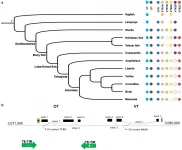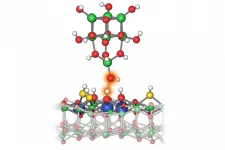Examining association between gender-affirming surgeries, mental health outcomes
2021-04-28
(Press-News.org) What The Study Did: The association between undergoing gender-affirming surgery and mental health outcomes was looked at in this study.
Authors: Anthony N. Almazan, B.A., of Harvard Medical School in Boston, is the corresponding author.
To access the embargoed study: Visit our For The Media website at this link https://media.jamanetwork.com/
(doi:10.1001/jamasurg.2021.0952)
Editor's Note: The article includes conflict of interest and funding/support disclosures. Please see the article for additional information, including other authors, author contributions and affiliations, conflict of interest and financial disclosures, and funding and support.
INFORMATION:
Media advisory: The full study and commentary are linked to this news release.
Embed this link to provide your readers free access to the full-text article This link will be live at the embargo time https://jamanetwork.com/journals/jamasurgery/fullarticle/10.1001/jamasurg.2021.0952?guestAccessKey=3ee564b8-849e-4cb3-b03f-d7bea864f037&utm_source=For_The_Media&utm_medium=referral&utm_campaign=ftm_links&utm_content=tfl&utm_term=042821
ELSE PRESS RELEASES FROM THIS DATE:
2021-04-28
Enhancing the brain's lymphatic system when administering immunotherapies may lead to better clinical outcomes for Alzheimer's disease patients, according to a new study in mice. Results published April 28 in Nature suggest that treatments such as the immunotherapies BAN2401 or aducanumab might be more effective when the brain's lymphatic system can better drain the amyloid-beta protein that accumulates in the brains of those living with Alzheimer's. Major funding for the research was provided by the National Institute on Aging (NIA), part of the National Institutes of Health, and all study data is now freely available ...
2021-04-28
For the first time, scientists are able to study changes in the DNA of any human tissue, following the resolution of long-standing technical challenges by scientists at the Wellcome Sanger Institute. The new method, called nanorate sequencing (NanoSeq), makes it possible to study how genetic changes occur in human tissues with unprecedented accuracy.
The study, published today (28 April) in Nature, represents a major advance for research into cancer and ageing. Using NanoSeq to study samples of blood, colon, brain and muscle, the research also challenges the idea that cell division is the main mechanism ...
2021-04-28
Models that can successfully predict suicides in a general population sample can perform poorly in some racial or ethnic groups, according to a study by Kaiser Permanente researchers published April 28 in JAMA Psychiatry.
The new findings show that 2 suicide prediction models are less accurate for Black, American Indian, and Alaska Native people and demonstrate how all prediction models should be evaluated before they are used. The study is believed to be the first to look at how the latest statistical methods to assess suicide risk perform when tested specifically in different ethnic and racial groups.
More ...
2021-04-28
WASHINGTON, D.C., (April 28, 2021) - The latest, comprehensive data from The North American COVID-19 Myocardial Infarction (NACMI) Registry was presented today as late-breaking clinical research at the Society for Cardiovascular Angiography & Interventions (SCAI) 2021 Scientific Sessions. Results reveal in these series of STEMI activations during the COVID era, patients who tested positive for COVID-19 were less likely to receive diagnostic angiograms. Those with COVID-19 positive status had higher in-hospital mortality. The prospective, ongoing observational registry was created under the guidance of the SCAI, Canadian Association of Interventional Cardiology (CAIC) and American College of Cardiology (ACC). ...
2021-04-28
WASHINGTON, D.C., (April 28, 2021) - Two new studies, presented today as late-breaking clinical science at the Society for Cardiovascular Angiography & Interventions (SCAI) 2021 Scientific Sessions, provide new treatment insights for cardiogenic shock (CS) patients. A study of the SCAI cardiogenic shock stages consensus document confirms the accuracy of the shock classification. In addition, an analysis of the National Cardiogenic Shock Initiative demonstrates use of a shock protocol emphasizing early use of mechanical circulatory support may lead to improved survival for patients with CS.
CS is a rare, life-threatening ...
2021-04-28
WASHINGTON, D.C, (April 28, 2021) - An analysis of the prospective Fuwai PCI Registry, confirms long-term dual antiplatelet therapy (DAPT) is an optimal treatment option for acute coronary syndrome patients (ACS) following a percutaneous coronary intervention (PCI). The study shows long-term DAPT reduces ischemic events without increasing bleeding or other complications as compared to short-term DAPT treatments. The study was presented today as late-breaking clinical research at the Society for Cardiovascular Angiography &Interventions (SCAI) 2021 Scientific Sessions.
Following ACS, patients have a high risk of ischemic events, which impacts chances of survival. Patients are predisposed for blood clots ...
2021-04-28
Chinese scientists have made direct observations in face-centered cubic VCoNi (medium)-entropy alloys (MEA) and for the first time proposed a convincing identification of subnanoscale chemical short-range order (CSRO). This achievement undisputedly resolves the pressing question of if, what and why CSRO exists, and how to explicitly identify CSRO.
This work, published in Nature on April 29, was conducted by Prof. WU Xiaolei from the Institute of Mechanics of the Chinese Academy of Sciences (CAS) in collaboration with Prof. MA En's team from Xi'an Jiaotong University and Prof. ZHU Jing's team from Tsinghua University.
Multi-principal element alloys--also known as high (medium)-entropy alloys (HEAs/MEAs)--are a hot and frontier topic in multidisciplinary fields. In these ...
2021-04-28
Oxytocin and arginine vasopressin are two hormones in the endocrine system that can act as neurotransmitters and regulate -in vertebrates and invertebrates- a wide range of biological functions, such as bonding formation, breastfeeding, birth or arterial pressure. Biochemists in the pregenomic era, named these genes differently in different species, due to small protein coding differences.
A new study carried out by the University of Barcelona (UB) and the Rockefeller University, published in the journal Nature, has analysed and compared the genome of 35 species representing ...
2021-04-28
Researchers have discovered an explanation for why cerebral cavernous malformations (CCMs)--clusters of dilated blood vessels in the brain--can suddenly grow to cause seizures or stroke. Specifically, they found that a specific, acquired mutation in a cancer-causing gene (PIK3CA) could exacerbate existing CCMs in the brain. Furthermore, repurposing an already existing anticancer drug showed promise in mouse models of CCMs in improving brain-vascular health and preventing bleeding into the brain tissue.
Previous studies linked the initial formation of CCMs to various environmental factors, including ...
2021-04-28
The degree of acidity or alkalinity of a substance is crucial for its chemical behavior. The decisive factor is the so-called proton affinity, which indicates how easily an entity accepts or releases a single proton. While it is easy to measure this for molecules, it has not been possible for surfaces. This is important because atoms on surfaces have very different proton affinities, depending on where they sit.
Researchers at TU Wien have now succeeded in making this important physical quantity experimentally accessible for the first time: Using a specially modified atomic force microscope, it is possible to study the proton affinity of individual atoms. This should help to analyze catalysts on an atomic scale. The results have been published in the scientific journal Nature.
Precision ...
LAST 30 PRESS RELEASES:
[Press-News.org] Examining association between gender-affirming surgeries, mental health outcomes


